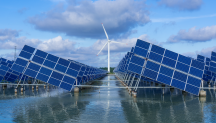

IRENA Global Atlas Upgrade Enhances Understanding of Countries’ Renewables Potential
Newsletter
Since its inception ten years ago, the IRENA Global Atlas for Renewable Energy has been the hub for open-source renewable resource assessment and data sharing. The new version 4.1 marks a significant milestone with substantial upgrade in capabilities and functionalities.
Building upon its previous version 4.0, the Global Atlas 4.1 enhances users’ experience with a more diverse and comprehensive range of datasets, which resulted from a strong collaboration within the resource data and assessment community. The new version offers historical meteorological reanalysis data from the National Aeronautics and Space Administration (NASA) and the European Centre for Medium-Range Weather Forecasts (ECMWF), global agro-ecological zoning version 4 by the Food Agriculture Organisation (FAO), and global pumped hydro energy storage by the Australian National University (ANU).
The 4.1 version offers advanced functionalities for more efficient data screening and retrieval. It also includes country-specific resource statistics and zones for investment opportunities for solar photovoltaics and onshore wind project development in several countries in Africa, Latin America and Southeast Asia, with more countries to add next year.

With such zonal techno-economic attributes, the zoning assessment components will support energy planners and modellers, as well as aid countries in planning projects and setting their renewable energy development targets.

Opening the launch webinar of the Global Atlas version 4.1, IRENA Director-General, Francesco La Camera emphasised how global access to data is essential in ensuring that the renewable energy targets set by countries are substantive and achievable. In that regard, he said, “The Global Atlas functions as a valuable online platform for assessing renewable energy opportunities and acquiring a thorough understanding of a region or nation's renewable energy potential. It promotes data sharing and advances the deployment of all forms of renewable energy.”
The Global Atlas has been instrumental in propelling renewable energy initiatives forward. Activities stemming from the Global Atlas for Renewable Energy initiative have assisted two regions in identifying prime project zones, facilitated site-specific evaluations for over 150 large-scale projects in 13 countries, and enabled 20 cities to evaluate the technical feasibility of rooftop solar PV installations. These achievements span regions like the Gulf countries, Latin America, Sub-Saharan Africa, and Small Island Developing States.
Moderating the webinar, Rabia Ferroukhi, Director of Knowledge Policy and Finance, said, “The notable progress of this initiative underscores IRENA’s dedication to enhancing and addressing the evolving needs of its members as they transition towards a sustainable energy future.” She also expressed her appreciation to all of the data providers and contributors to the platform.
Uniting a worldwide network of over 40 contributors, involving research institutions, private enterprises, and international organisations, the initiative highlights the importance of international collaboration in resource assessment. Furthermore, data providers are encouraged to actively engage and contribute to this collaborative effort, ensuring that the platform remains a dynamic and invaluable resource for a sustainable energy future. See the new version of IRENA Global Atlas here.




